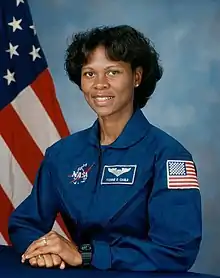Yvonne Cagle
Yvonne Darlene Cagle (born April 24, 1959) is an American NASA Management Astronaut.
Yvonne Cagle | |
|---|---|
 | |
| Born | April 24, 1959 West Point, New York, U.S. |
| Status | NASA management |
| Nationality | American |
| Occupation | Medical Doctor |
| Space career | |
| NASA Astronaut | |
| Rank | Colonel, USAF |
| Selection | NASA Astronaut Group 16 (1996) |
| Missions | None |
Education
Born in West Point, New York, Yvonne Cagle graduated from Novato High School in Novato, California.[1] She received her bachelor's degree in biochemistry from San Francisco State University in 1981, and a doctor of medicine degree from the University of Washington in 1985. She completed a transitional internship at Highland General Hospital in Oakland, California in 1985 and received a certificate in Aerospace Medicine from the School of Aerospace Medicine at Brooks Air Force Base, Texas, in 1988. She then went on to complete a residency in family practice at Ghent FP at Eastern Virginia Medical School in 1992 and received certification as a senior aviation medical examiner from the Federal Aviation Administration in 1995.
US Air Force
Cagle retired from the United States Air Force with the rank of Colonel in 2008.[2][3] In May 1989 as a commissioned medical officer assigned to the 48th Tactical Hospital, United Kingdom, Cagle served as Air Force Medical Liaison Officer for STS-30 mission to test the Magellan spacecraft, before she became a NASA astronaut.[3] She worked as medical doctor at NASA's Occupational Health Clinic from 1994 to 1996.[3] In 1996 she was selected for astronaut training by NASA.[3]
Astronaut career
Yvonne Cagle was a member of the Astronaut Class of 1996 (NASA Astronaut Group 16). She is currently assigned to Johnson Space Center's Space and Life Sciences Directorate.[4]
Cagle is also an advisor for NASA's Flight Opportunities Program (originally named CRuSR – Commercial Reusable Suborbital Research Program).[5] Currently Dr. Cagle is on faculty and serves as the NASA liaison for exploration and space development with Singularity University. During the workshop, Dr. Cagle was embedded with the crew as a crew training consultant and advisor, providing insights and feedback to both crew and study team from the viewpoint of an astronaut, flight surgeon, space development expert, and science liaison.
In 2013, she was selected as part of the reserve crew for Hawai'i Space Exploration Analog and Simulation (HI-SEAS), which is part of a study for NASA to determine the best way to keep astronauts well nourished during multiple-year missions to Mars or the moon.[6] Furthermore, Dr. Cagle is also listed as an honorary member of the Danish Astronautical Society.[7]
In 2014, Cagle was a visiting professor to Fordham University where she was participating in interdisciplinary research in health, environment and human Performance.[8] She was awarded an honorary Ph.D. by Fordham University for her substantial and significant contributions to the fields of science, technology and human health.[9]
Cagle never flew on a space mission, and as of no later than June 2017[10] was deemed a NASA Management Astronaut, which means that she is employed at NASA but is no longer eligible for spaceflight assignments; she still appears on the active list of NASA Management Astronauts as of January 2021, assigned to NASA's Ames Research Center in Mountain View, California,[11] in addition to her previously mentioned work as a professor and visiting professor.
Other
In 2017, she brought Katherine Johnson onto the stage at the Academy Awards.[12]
References
- "Astronaut Yvonne Cagle named S.F. State's centennial commencement speaker and Alumna of the Year". SFSU. May 3, 1999. Retrieved November 2, 2015.
- "Dr. Yvonne Cagle — Splashdown 45 - USS Hornet Museum Celebrates Apollo 11 Anniversary". Hornetsplashdown.com. Archived from the original on March 14, 2016. Retrieved February 28, 2017.
- "Astronaut Bio: Yvonne Cagle (9/2014)". Jsc.nasa.gov. Retrieved February 28, 2017.
- "Astronaut Bio: Yvonne Cagle (6/2007)". Jsc.nasa.gov. Retrieved October 20, 2013.
- NASA. "NASA Flight Opportunities". Retrieved October 20, 2013.
- "Hawai'i Space Exploration Analog and Simulation mission site". Hi-Seas.org. Retrieved July 6, 2013.
- "Archived copy". Archived from the original on July 14, 2014. Retrieved July 5, 2014.CS1 maint: archived copy as title (link) Official website of Danish Astronautical Society
- Joanna Mercuri (September 8, 2014). "GSS and NASA Astronaut Form Interdisciplinary Collaborative".
- "Past Honorary Degree Recipients". Fordham University. Retrieved June 13, 2018.
- "NASA Management Astronauts: June 2017". NASA. June 8, 2017. Retrieved January 24, 2021.
- "NASA Management Astronauts: January 2021". NASA. January 24, 2021. Retrieved January 24, 2021.
- ""Moonlight" Triumphs at Oscars, Wins Best Picture, Adapted Screenplay and Supporting Actor". Good Black News. February 24, 2017. Retrieved February 28, 2017.
Further reading
- Gubert, Betty Kaplan; Sawyer, Miriam; Fannin, Caroline M (2002). Distinguished African Americans in aviation and space science. Westport, Conn.: Oryx Press. p. 319. ISBN 9781573562461. Retrieved March 24, 2018.
- Sonnee D, Weedn (2011). Many blessings : a tapestry of accomplished African American women. Novato, Calif.: Chispa Publishing. p. 303. ISBN 9780983277606. OCLC 758374558.
- Woodmansee, Laura S (2002). Women astronauts. Burlington, Ont.: Apogee Books. p. 168. ISBN 9781896522876. OCLC 50438312.